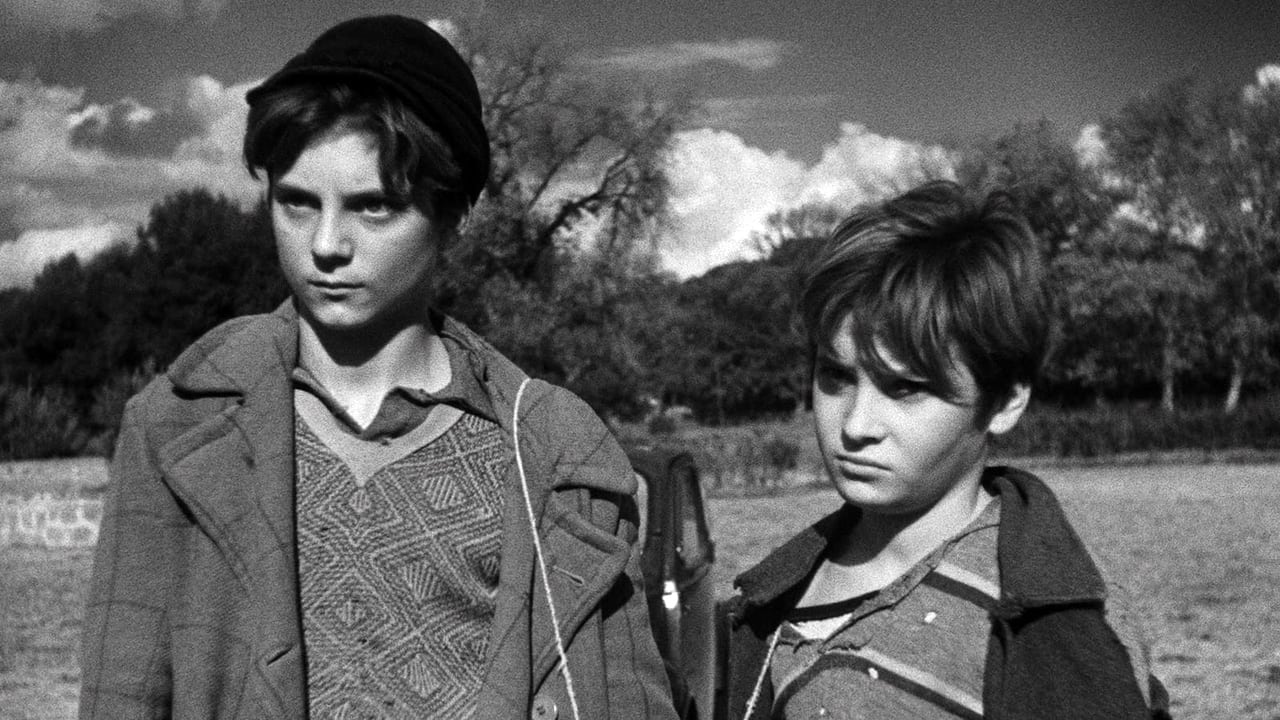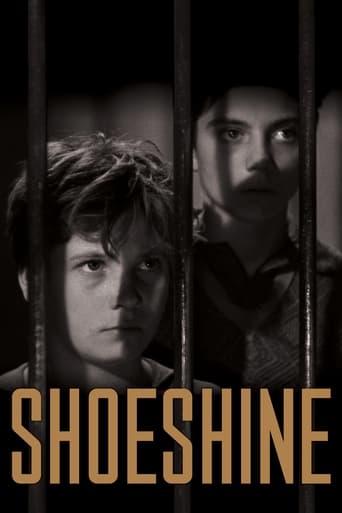

This movie follows a couple of young teenage friends (Pasquale and Giuseppe) who are trying to survive, by shining shoes, in the difficult conditions in Italy after WWII. Pasquale is homeless and has been sleeping in elevators while Giuseppe is a bit better off, having a mother and brother living. However, it is Giuseppe's brother who involves the two friends in selling army blankets on the black market. From their rather innocent involvement in this scheme the boys are ultimately arrested and sent to a prison for juveniles. The bulk of the movie takes place in the prison and it is there that things start going very wrong for the two friends, leading to an ultimate tragedy. For me the power of the movie lies in its depiction of how a society on its ass creates a toxic environment that grinds people up in a downward spiral that they are powerless to control. I did not get the sense of any overarching evil on anybody's part--people on all levels were just tying to get by. The movie portrays how the social structure was overwhelmed in its attempt to climb out of the hole left by the war.There were some things that seemed inconsistent with the stark realism. The two friends are seen saving up to buy a horse that is being rented out to upper class people. I appreciate the value of the horse as a symbol of freedom and how people who are down can still have dreams, but was it realistic to think that the kids could buy the horse on income from shining shoes? The musical score often intruded with a sentimentality that seemed out of place. For kids who were supposedly on the verge of starvation, the kids in the prison seemed remarkably healthy, even the small kid with tuberculosis.I found the commentary track on the DVD to be of interest, since it made some points that I would otherwise not have noticed, like how the filming of the two friends mimics their relationship--close together on the screen at first and later separated.This is an example of how a quality movie can inform you about a small slice of history in a more effective manner than reading history books.
... View MoreI have watched the unforgettable and justifiably renowned Bicycle Thief, and the impressive Umberto D. I had long been wanting to watch Shoeshine and finally saw it last evening, enjoying it as movies are meant to be enjoyed - on a big home screen with my new projector. The movie starts on a perky note - two boys, close friends, exuberant at having bought a horse they both love. One is almost lulled into thinking that this will be a buoyant movie about friendship and a horse. It turns out to be several shades darker. It is De Sica's genius that he can pull you in so quickly and make you feel such strong empathy for the two boys as they are brutalized by life within a short span of a few days; their friendship souring and spiraling down towards an ominous end. Be warned, this is a depressing movie. But it is a gem nonetheless, and I know that several scenes will remained etched in my mind forever. In particular, De Sica captures in a starkly beautiful manner the quicksilver bonding and the territorial rivalries of the boys trapped in a bleak Dickens' style detention center. A must watch for any fan of that strain of Italian cinema from the 1940s and 50s.
... View More(Spoilers) The separation of hands; that's what the movie is about. In postwar Rome two shoe shine boys, young friends, after some bad luck with adult black-marketeering, and false accusation of theft, are sent to a Rome juvenile prison. As each is put into separate cells, their hands cling, resistant to the forced separation of their hands, of their affections."Shoe Shine," one of the most devastating films of all time about good youth in bad trouble, is really about what this separation of hands implies. They and we are thrust amid uncaring officials, in a prison that seems like a slow-to-die fascist institution in this post-fascist Italy. A prison inspector still imparts, involuntarily, the fascist salute. The upraised hand of the fascist salute contrasts with the desperate friendship and fraternal love in the hands of the two boys, Pasquale and Giuseppe, whom the system will hurt in the worst way possible, by separating them, by turning one against the other, by causing one to be responsible for the death of the other. Is there any greater cruelty?"Shoe Shine" is one of my favorite films of all time, and one of the greatest and most overwhelmingly moving Italian films ever made in some ways even more potent than director De Sica's "The Bicycle Thief" or "Umberto D." The two boys are beautifully played by Franco Interlenghi as the older boy, Rinaldo Smordoni as the younger. In addition to them is another figure of innocence, the little Neapolitan Raffaele (Aniello Mele). He is in this hell-hole for kids merely because he has been abandoned by his mother. Sick and doomed to TB, despite the humane concern (the only true adult humanity we see here) of the new prison assistant Bartoli, he is a son anyone in his right mind would be honored to have. He commands respect even with the tyrannical prison chief Staffera when he slaps everyone to find out about the source of a chisel in a cell. He does not dare lay his hand to this generous little person who gives his food away who shows a kindness of a stature beyond his years.Raffaele was the boy-saint who tried to re-join the hands of his two friends, Giuseppe and Pasquale. This fails. The outside forces are too massed. In the tragic end, it is Pasquale who screams his lost friend's name, his hands trying to stir Giuseppe's now unmoving body. His hands.
... View MoreSciuscia, or Shoeshine, tells a tragedy involving two boys, Pasquale and Giuseppe, both of whom try and make money from shining shoes, and also in dealing with black market goods. They hope to buy a horse one day (a wonderful opening shot of a horse running fast gets this point across since this is at its core a film of adolescence), but complications involving Giuseppe's older brother and gang land the two boys in jail just as they have enough for the horse. The film then deals with the boys in the reformatory/prison, over-crowded with conniving, shady influences as cell-mates, as well as the people who run the prison. To tell anymore of the plot would ruin it for the viewer who would go out of his way to find this - it's near impossible to find, which is a shame since The Bicycle Thief and Umberto D. are readily available in most stores and rentals - and it's enough to say that much of the film relies more on character than story. Because the director's dealing with a group of near total unknowns, they come first. This film, by Vittorio De Sica, was made very soon after the War had decimated the country he lived in. He didn't just want to make this movie, he had to- these characters are as real as their backdrop, a country still in the aftermath of a fascist state of affairs, and since the film deals with children there's all the more emotion to it. The only, very minor liability in the film is that the drama in the material isn't as simple and everyday as DeSica's later, more famous efforts; if it was under different direction it could've become a forgettable tearjerker. But the tragedies of these characters, Pasquale and Giuseppe, is splendid in the humanity that they feel, as it unfolds, and by the end it rings as true as any other given neo-realist effort of the late 40's and early 50's. Shoeshine is one of those rarities that may give a tear-jerker to someone who isn't expecting one, and I mean that as a compliment. Note, if you find this tape, it may be rather grainy and slightly shifty in frame, and the subtitles aren't complete- not to downplay the worth of the film in and of itself, however.
... View More